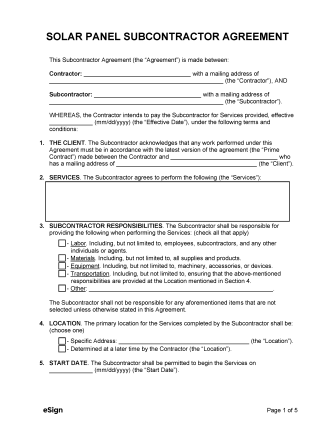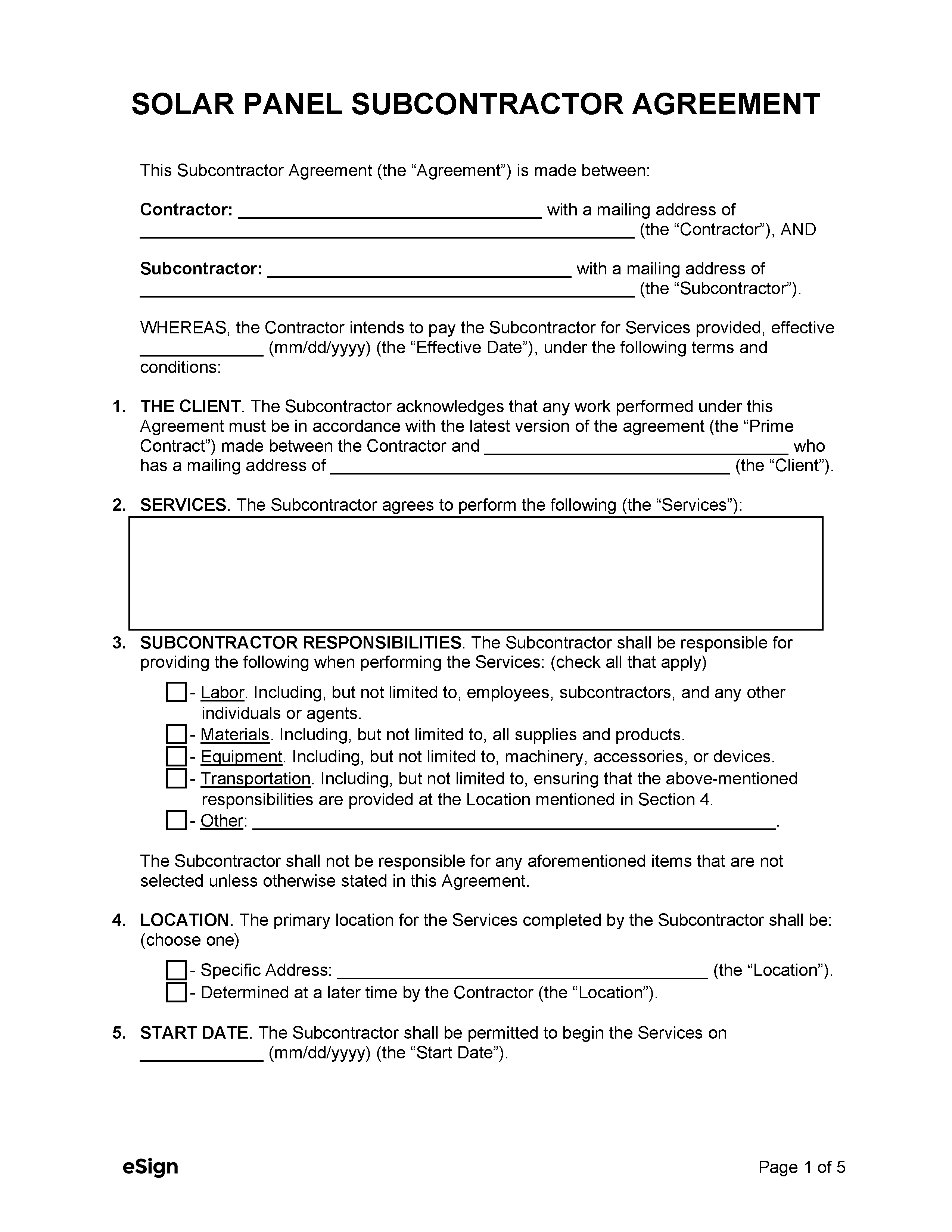Why an Agreement is Important
A written agreement records the legal relationship between the two parties. This written record ensures that if either contractor or subcontractor fails to uphold their end of the contract, the other party can use it to prove claims for damages.
Common Provisions
1. Independent Contractor Status
A key function of the agreement is that it defines the subcontractor’s standing as an independent worker, not an employee of the contractor. As an independent contractor, they are responsible for their own insurance, taxes, and how the job gets carried out.
2. Services
The tasks that the subcontractor is hired to perform must be described in the agreement, which might include:
- Site assessment and schematics.
- Measuring, cutting, and assembling structural framing and solar modules.
- Connecting PV panels to (and possibly making improvements on) electrical systems.
- Performing maintenance checks.
3. Responsibilities
The parties must decide who will provide materials, equipment, transportation, labor (i.e., workers under the subcontractor), and anything else the subcontractor needs to perform their duties.
4. Compensation
The contractor and subcontractor must negotiate and record the amount of money the subcontractor will receive for their services (typically a fixed fee or hourly rate) and the payment schedule.
5. Termination
The parties must establish who can terminate the contract early and how much notice is required to do so.
Sample
Download: PDF, Word (.docx), OpenDocument
SOLAR PANEL SUBCONTRACTOR AGREEMENT
1. THE PARTIES. This Subcontractor Agreement (“Agreement”) is made between [CONTRACTOR NAME], with a mailing address of [CONTRACTOR ADDRESS] (“Contractor”), and [SUBCONTRACTOR NAME], with a mailing address of [SUBCONTRACTOR ADDRESS] (“Subcontractor”).
WHEREAS, the Contractor intends to pay the Subcontractor for Services provided, effective [DATE], under the following terms and conditions:
2. THE CLIENT. The Subcontractor acknowledges that any work performed under this Agreement must be in accordance with the latest version of the agreement made between the Contractor and [CLIENT NAME], who has a mailing address of [CLIENT ADDRESS] (“Client”).
3. SERVICES. The Subcontractor agrees to perform and be responsible for the following: [LIST SERVICES] (hereinafter the “Services”).
4. RESPONSIBILITIES. The Subcontractor shall be responsible for providing the following when performing the Services: [LIST RESPONSIBILITIES]
The Subcontractor shall not be responsible for any items that are not listed unless otherwise stated in this Agreement.
5. LOCATION. The primary location for the Services shall be [ADDRESS].
6. START & END DATES. The Subcontractor shall be permitted to begin the Services on [DATE] and shall complete the Services in a reasonable time period in accordance with industry standards.
7. PAYMENT. The Contractor shall pay the Subcontractor $[AMOUNT] per [PAYMENT BASIS (E.G., HOUR)] for the Services. Payment shall be made by [PAYMENT METHOD] every [PAYMENT FREQUENCY].
8. TERMINATION. Either party can terminate this Agreement by providing [#] days’ notice to the other party.
9. SUBCONTRACTING. The Subcontractor shall (☐ Have | ☐ Not Have) the right to subcontract, either in part or in whole, the Services authorized under this agreement.
10. DISPUTES. If a dispute arises concerning the provisions of this Agreement or the performance of any of the parties mentioned, the parties hereby agree to settle the dispute by equally paying for binding arbitration as regulated under the laws in the state where the Services are being performed.
11. REQUIRED LICENSES. All parties to this Agreement, including other subcontractors and the parties’ employees and agents, must be licensed per state laws governing their trade.
12. INDEMNIFICATION. The Subcontractor shall indemnify and hold the Contractor and Client harmless from any loss or liability from performing the Services under this Agreement.
13. INDEPENDENT CONTRACTOR. The Subcontractor is an independent contractor, and neither the Subcontractor nor their employees or contract personnel are or shall be deemed the Contractor’s employees.
14. GOVERNING LAW. This Agreement shall be governed under the laws in the State of [STATE].
IN WITNESS WHEREOF, the parties have executed this Agreement on the dates written hereunder.
Contractor Signature: _____________________ Date: [DATE]
Print Name: [CONTRACTOR NAME]
Subcontractor Signature: _____________________ Date: [DATE]
Print Name: [SUBCONTRACTOR NAME]

